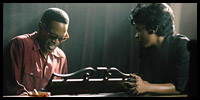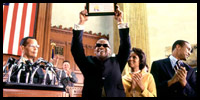
 |
|
Ray (2004) Cast: Jamie Foxx, Kerry Washington, Regina King, Clifton Powell, Harry J. Lennix, Sharon Warren, C.J. Sanders, Aunjanue Ellis, Bokeem Woodbine, David Krumholtz, Richard Schiff, Larenz Tate, Curtis Armstrong, Terrence Dashon Howard, Denise Dowse, Warwick Davis, Wendell Pierce, Kimberly Ardison, Renee Wilson, Patrick Bauchau, Robert Wisdom, Kurt Fuller, Terrone Bell 2004 – 152 minutes Rated: Reviewed by Dustin Putman, October 27, 2004.  There may be a great film in the life story of late iconic musical genius Ray Charles, but "Ray" isn't it. Set primarily during Charles' formative years between 1948 and 1965, director Taylor Hackford (2000's "Proof of Life") and first-time screenwriter James L. White parade out a greatest hits of the events during his rise to stardom without managing to make it seem personal and true. As far as biopics go, "Ray" covers all of the conventional, melodramatic bases—his drug abuse, the affairs he had behind the back of his long-suffering wife, his childhood roots in the South involving a tragic death and his own blindness. While these elements were, indeed, a part of Ray Charles' life, the paint-by-numbers approach taken in portraying them quickly becomes tedious and predictable.
There may be a great film in the life story of late iconic musical genius Ray Charles, but "Ray" isn't it. Set primarily during Charles' formative years between 1948 and 1965, director Taylor Hackford (2000's "Proof of Life") and first-time screenwriter James L. White parade out a greatest hits of the events during his rise to stardom without managing to make it seem personal and true. As far as biopics go, "Ray" covers all of the conventional, melodramatic bases—his drug abuse, the affairs he had behind the back of his long-suffering wife, his childhood roots in the South involving a tragic death and his own blindness. While these elements were, indeed, a part of Ray Charles' life, the paint-by-numbers approach taken in portraying them quickly becomes tedious and predictable.
 Blind since the age of seven (and frequently flashing back to this time period), the film begins in earnest in 1948, as Ray Charles Robinson (Jamie Foxx) boards a bus to Seattle to play piano at a dive downtown. The workers and patrons there are quickly taken by this man and his music, who refuses to be treated like a handicap and lights up the room with his singing talents. After having a meet-cute with his soon-to-be wife, Della Bea (Kerry Washington), Ray's musical career takes off, later forming a slam-bang trio of back-up singers called the Raylettes. But, as he becomes loved by millions for his music and extraordinarily wealthy, his weaknesses with women, including Raylette header Margie (Regina King), hard drugs, and terrible memories of his past soon take their toll on himself and his family.
Blind since the age of seven (and frequently flashing back to this time period), the film begins in earnest in 1948, as Ray Charles Robinson (Jamie Foxx) boards a bus to Seattle to play piano at a dive downtown. The workers and patrons there are quickly taken by this man and his music, who refuses to be treated like a handicap and lights up the room with his singing talents. After having a meet-cute with his soon-to-be wife, Della Bea (Kerry Washington), Ray's musical career takes off, later forming a slam-bang trio of back-up singers called the Raylettes. But, as he becomes loved by millions for his music and extraordinarily wealthy, his weaknesses with women, including Raylette header Margie (Regina King), hard drugs, and terrible memories of his past soon take their toll on himself and his family.
 "Ray" has two strong attributes, one a foregone conclusion. The soundtrack, which features practically all of Ray Charles' big hits, crackles and pops with energy. Whenever the incendiary classic songs themselves are at the forefront of scenes, allowing them to play out with Ray at the piano and the Raylettes performing by his side, the film takes off. The other notable quality of "Ray" can be found in the uncanny performance by Jamie Foxx (2004's "Collateral"), who embodies this well-known figure with almost precise accuracy.
"Ray" has two strong attributes, one a foregone conclusion. The soundtrack, which features practically all of Ray Charles' big hits, crackles and pops with energy. Whenever the incendiary classic songs themselves are at the forefront of scenes, allowing them to play out with Ray at the piano and the Raylettes performing by his side, the film takes off. The other notable quality of "Ray" can be found in the uncanny performance by Jamie Foxx (2004's "Collateral"), who embodies this well-known figure with almost precise accuracy.
 Regrettably, Foxx doesn't get much help from a screenplay that often casts Ray Charles in a negative light. There is no sugarcoating in his representation, a good thing—Charles was a man with a lot of personal demons who turned to drugs and women to momentarily dull the pain—but it is also difficult to like him from an audience perspective outside of his music. He neglects and lies to his wife and children (only cursorily seen), for one thing, and attempts at redemption in the final minutes come too little, too late to garner much in the way of sympathy for him. Because the picture is only set during his "dark" years, shortchanging all of the charitable work he did later in his life and the mending of his marriage with a measly concluding footnote, it is difficult to see past the mistakes he made. And, dwelling on a twenty-year span of his seventy-plus-year life while still clocking in at over two-and-a-half hours in length, the picture manages to still feel both vague in its details and repetitious in its standard-issue plot trajectory.
Regrettably, Foxx doesn't get much help from a screenplay that often casts Ray Charles in a negative light. There is no sugarcoating in his representation, a good thing—Charles was a man with a lot of personal demons who turned to drugs and women to momentarily dull the pain—but it is also difficult to like him from an audience perspective outside of his music. He neglects and lies to his wife and children (only cursorily seen), for one thing, and attempts at redemption in the final minutes come too little, too late to garner much in the way of sympathy for him. Because the picture is only set during his "dark" years, shortchanging all of the charitable work he did later in his life and the mending of his marriage with a measly concluding footnote, it is difficult to see past the mistakes he made. And, dwelling on a twenty-year span of his seventy-plus-year life while still clocking in at over two-and-a-half hours in length, the picture manages to still feel both vague in its details and repetitious in its standard-issue plot trajectory.
 In a large ensemble that features countless recognizable faces and talents, only two supporting performances stand out and individualize themselves. As put-upon wife Della Bea, Kerry Washington (2004's "Against the Ropes") brings a strong-willed but helpless humanity to her scenes. Less fortunately, Washington's role is a standard, oft-encountered one, as she mostly stands on the sidelines, pleading for her husband to get off drugs while not being nearly as ignorant about his infidelities as he thinks. The most emotionally lingering relationship in the film is between Ray and mistress/back-up singer Margie, who grow to love each other but are ill-fated from the start. Regina King (2004's "A Cinderella Story") is excellent as Margie, simultaneously vivacious and touching, a woman with a lot of dreams for herself and too many addictions to go along with them.
In a large ensemble that features countless recognizable faces and talents, only two supporting performances stand out and individualize themselves. As put-upon wife Della Bea, Kerry Washington (2004's "Against the Ropes") brings a strong-willed but helpless humanity to her scenes. Less fortunately, Washington's role is a standard, oft-encountered one, as she mostly stands on the sidelines, pleading for her husband to get off drugs while not being nearly as ignorant about his infidelities as he thinks. The most emotionally lingering relationship in the film is between Ray and mistress/back-up singer Margie, who grow to love each other but are ill-fated from the start. Regina King (2004's "A Cinderella Story") is excellent as Margie, simultaneously vivacious and touching, a woman with a lot of dreams for herself and too many addictions to go along with them.
 Geared with unwarranted prerelease hype that has more to do with Jamie Foxx's Oscar-bound performance than the motion picture itself, "Ray" is a disappointingly unoriginal and one-note biography of a man and his life that were anything but. The music is certainly a showstopper, but that comes merely as a bonus for director Taylor Hackford, whose cinematic telling that surrounds the tunes doesn't hold up its end of the bargain. Ray Charles may rightfully never be forgotten as a one-of-a-kind artist, but the lackluster treatment he has received in "Ray" would be more at home in a soap opera or made-for-television movie.
Geared with unwarranted prerelease hype that has more to do with Jamie Foxx's Oscar-bound performance than the motion picture itself, "Ray" is a disappointingly unoriginal and one-note biography of a man and his life that were anything but. The music is certainly a showstopper, but that comes merely as a bonus for director Taylor Hackford, whose cinematic telling that surrounds the tunes doesn't hold up its end of the bargain. Ray Charles may rightfully never be forgotten as a one-of-a-kind artist, but the lackluster treatment he has received in "Ray" would be more at home in a soap opera or made-for-television movie.
|
© 2004 by Dustin Putman |














